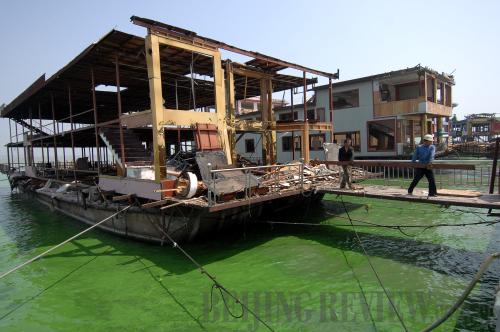|
 |
|
TAKING A STAND: Workers in Wuxi, Jiangsu Province, dismantle a lakeside restaurant on August 23, 2007, as part of an anti-pollution campaign after an algae bloom in the Taihu Lake (HAN YUQING) |
Crisscrossed by more than 3,100 rivers, Wuxi City in east China's Jiangsu Province is a typical water town. To ensure water quality there, the city's officials have been appointed river administrators to oversee pollution control in the waterways assigned to them since 2008.
Due to its proven effectiveness in improving river health in just a few years, Wuxi's experience has been borrowed by many other places throughout the country.
At a press conference held on March 21, Jiao Yong, Vice Minister of Water Resources, also revealed that his ministry planned to promote this innovative practice nationwide.
The practice of appointing officials river administrators aims to encourage local governments to integrate resources and take full responsibility for the ecological quality of rivers and lakes, said Sun Jichang, Director of the Construction and Management Department of the Ministry of Water Resources.
Birth of an idea
River administrators were appointed in Wuxi after the city suffered from a drinking water crisis in 2007.
In May and June of that year, blue-green algae grew rampantly in the Taihu Lake, which is mainly located in Wuxi and is one of the largest freshwater lakes in China. According to state broadcaster China Central Television, the algae built up near one of Wuxi's major water plants, making the city's water putrid and undrinkable. The incident affected the quality of drinking water for nearly 2 million residents, and led to panic buying of bottled water and soaring prices as supplies ran out.
The algae outbreak was caused by both natural and human factors, according to Zhang Lijun, then Vice Minister of the State Environmental Protection Administration, which is now known as the Ministry of Environmental Protection.
Zhang said that in that year, dry weather led to a lower water level in the Taihu Lake, while warmer-than-usual temperatures contributed to the growth of the algae.
On the other hand, the high concentration of nitrogen and phosphor in the Taihu Lake could be blamed. From 1996 to 2006, the lake's concentration of nitrogen and phosphor had grown 200 and 150 percent, respectively.
The Taihu Lake basin is one of the most economically advanced and densely populated regions in China. The area has a large concentration of factories and animal farms, which pollute the lake's water.
Data released by the Wuxi City Government in 2008 showed that the Taihu Lake area's annual per-capita GDP and population density were respectively 3 and 8 times those of national average, while in Wuxi, there were nearly 10 enterprises on every square kilometer of land.
After the drinking water crisis, Wuxi took a variety of emergency measures to clean up water such as removing the blue-green algae, sterilizing water with activated carbon, transferring water from the Yangtze River into the Taihu Lake and artificial rainmaking to dilute pollution. Moreover, the city also sought to build a long-term mechanism to improve water quality.
On August 23, 2008, the city issued a document making river water quality management as an important criterion in selecting officials and evaluating their performance. Wuxi's officials were respectively appointed administrators of the city's major rivers in their jurisdiction.
| 